George J. Veith
“I Want to Tell My Story”: Journalist Nguyen Tu and the Price of Courage (Part 1, Part 2, Part 3)
Prison
The destruction of Phu’s column on Route 7B unraveled South Vietnam’s defenses and caused panic to break out in I Corps, which also quickly fell to enemy forces. When Communist units launched the final assault on Saigon in late April 1975, the U.S. embassy offered to evacuate Tu. Dang Van Sung told Tu to escape, but like at Lao Cai and so many other places, Tu said no. Although he knew he would be arrested and either imprisoned or executed, he refused to flee. Tu also did not want to leave while other South Vietnamese journalists were left behind. He told journalist Vu Anh in the prison camp, “How could I go? The newspaper office was full of people who could not flee, so it would be cowardly for me to go.”
As a reporter, he also wanted to be an eyewitness to the Communist tanks entering Saigon. He knew it would be his last effort as a journalist for Chinh Luan. He would pay dearly for his courage.
South Vietnam surrendered on April 30, and the next day, Tu told Dang Van Sung to close the paper. “Better we do it,” he said, “than the Communists do it.”
Since his apartment in the Eden Hotel was occupied by some friends, he stayed at his friend Bui Diem’s apartment. The former ambassador had left Saigon a week before the fall, and he told Tu he could have his place.
Tu invited some Vietnamese reporters to join him there. Rather than applaud his decision to stay, many said he was a fool for not escaping. Tu also had several French journalists over. One was Jean Louis Arnaud, the local reporter for Agence France-Presse. Tu had promised to give Arnaud several manuscripts he had written about the war, but he was arrested the day before he could give it to him. The Communists confiscated everything he had, including the manuscripts.
Tu was arrested on May 7. He believed a Vietnamese reporter colleague informed on him. He was taken to Saigon Police headquarters, charged with being a traitor, and brought into a room to be interrogated.
There were two guards in the room. The cadre who questioned him was a middle-ranking guy who used a tactic to confuse Tu: giving him a chair with one short leg so he could not get comfortable.
Since the interrogator did not know who he was, he first asked Tu questions about his family. Then he asked Tu about his job.
Tu said, “I am a reporter.”
The cadre immediately suspected that Tu was CIA spy. The Communists believed every Vietnamese reporter worked for the CIA. He asked him what other names Tu had used.
Tu said he always used his own name, never an alias.
What did he write?
“I wrote against you,” Tu said.
What is the name of your paper?
Since it was obvious the cadre did not know him, Tu told him to go to Chinh Luan and find all of his writings.
Why did you not leave?
“Because I wanted to see how you came into the city.”
The cadre became angry and asked if Tu was mocking him.
Tu said no, everything he told him was the truth.
One of the guards then hit him with his rifle butt. The first stroke knocked out some of his teeth. The second broke a rib. The rib never healed, and he had chest pain for the rest of his life.
When he came to America, he kept going to the doctor to find the source of the pain. After numerous examinations, in April 2009, an X-ray showed that the rib was still cracked. The doctor could see it now on the X-ray because Tu had become so frail that he no longer had any muscle.
The cadre continued to interview him for several days. He did not believe that Tu had met high-ranking government officials.
“I know a lot of them,” he told them, “because I went to press conferences.” The cadre refused to accept Tu’s response, so Tu explained, “We live in an open society, you live in a closed society.”
The cadre then claimed that Tu was special, trying to get him to confess that he was a CIA spy. “No,” Tu said. “Any reporter can meet government officials.”
The interrogator still thought Tu was lying, but when he wrote his report to his boss, his boss scolded him for not confirming Tu’s statements. The cadre came back and said you made me look bad in front of my boss, but he congratulated Tu for telling the truth.
Tu had decided to never lie to them. This way, he told me, he did not have to remember his lies. Since he was not a soldier, he fought them with his mind, and the best weapon was the truth.
For example, they asked him, “Why did you not marry?”
When he told them he didn’t want to get married, they didn’t believe him, and they kept repeating the question.
“Ho Chi Minh never married either,” he finally said. “Well,” he told me, “this made them very angry. They shouted at me that I couldn’t say that, and they threatened me. I simply replied that it was the truth, and they could look it up. They changed the topic after that.”
Tu was held in a cell at the Saigon police station for two months, then transferred to a small prison in Saigon. To get him to confess to being a spy, the Communists tortured and beat him repeatedly. Ultimately, he was interrogated by four different men. The last was the most sophisticated. Although he did not wear any rank, Tu could tell from his bearing and language that he was high ranking.
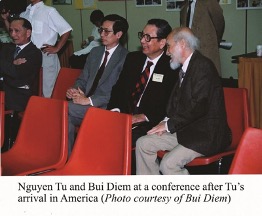 Since Tu refused to confess that he worked for the CIA, in December 1975, he was sent to Chi Hoa prison, the main penitentiary in the city. He was living with criminals, burglars, and murderers even though the Communists knew he was a reporter. At first it was difficult, but when he accidentally discovered the criminal’s code of honor, they treated him kindly. One day he lit a cigarette for a man, who then expressed his gratitude. He said no one in his life had ever done that for him and that it was a mark of friendship. From then on, this man protected Tu and brought Tu’s rations to him.
Since Tu refused to confess that he worked for the CIA, in December 1975, he was sent to Chi Hoa prison, the main penitentiary in the city. He was living with criminals, burglars, and murderers even though the Communists knew he was a reporter. At first it was difficult, but when he accidentally discovered the criminal’s code of honor, they treated him kindly. One day he lit a cigarette for a man, who then expressed his gratitude. He said no one in his life had ever done that for him and that it was a mark of friendship. From then on, this man protected Tu and brought Tu’s rations to him.
After enduring another beating by the Communists at Chi Hoa, his right side became paralyzed, but there was no medicine to treat him. One day an inmate encouraged Tu to smoke Vietnamese tobacco, claiming it would make Tu’s blood circulate and help his condition. “Tobacco” Tu said, “was rare in the prison, and if you had even a small amount, you were rich. A tiny pinch equaled your entire rice ration.” Yet the inmates scrounged up some tobacco and borrowed a pipe from a priest. About ten inmates gathered around to watch him smoke. He was surprised they were so respectful. Oddly, the tobacco cured his paralysis, but he remained weak on his right side for the rest of his life.
In 1982, he was moved to the Xuan Phuoc reeducation camp, an old Communist base deep in the forest in Tuy Hoa province. These were tough years. It was a hard labor camp, and food was scarce. The prison chief did not want him in the camp because he could not work due to his rib injury and weakness on his right side. One inmate made a truss for him so he could work by himself in the garden. Uyen Thao, the founder of Song Than newspaper, recalls that Tu often sneaked vegetables or grass under his jacket for the other inmates.
Tu, though, was often caught and sent to confinement. Laughing, he said, “I actually liked confinement because it was quiet. The only bad thing was if you were shackled. Then it was tough. But if you were not shackled, it was like having your own private bedroom.”
Even though he had fought the Communists, some Nationalists in the camp became angry at him because he did not hate them. “If you hate them,” he told me. “it blinds you. To defeat them, you need a certain degree of discipline and a wider view of life.”
In 1985, he was transferred to another camp near Xuan Loc, a town outside Saigon. This camp was much easier, and they had more rice. On February 14, 1988, after 13 years in prison, he was released. He was 51 when he went to prison and 64 when he left.
“Prison aged me terribly,” he said. “I looked and felt like an old man when they released me.” White-haired and frail, he had endured “torture, hard labor, humiliation, starvation, and constant lectures about Communism.” Many of his fellow inmates died in the disease-ridden camps.
He returned to Saigon, and luckily, he was hired by a family to educate their children. The Communists had prevented the kids from attending school because their father had worked for the old government. The family offered him money, but he said no, he only wanted food.
Every week several local security cadre came to where he lived to discuss his activities. When a security cadre discovered his employment, the cadre convinced the family to fire him by telling the parents that Tu had just been released from prison. Tu was then sentenced to house arrest.
After almost a year of confinement, the security cadre asked him if he wanted to go to America or stay in Vietnam. He wanted to stay, but since he had lost everything, he knew he had to leave. He told the security cadre “if you block me from working, then I have no choice but to go to a country that will let me live in freedom.”
Tu was about to embark on his last adventure.
Escape to the United States
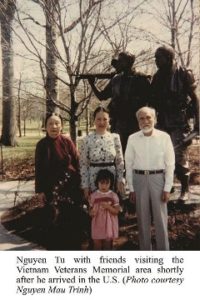 Now committed to leaving Vietnam, Tu needed an escape plan. In July 1989, he traveled north to Haiphong, where a friend gave him some gold to purchase his place on a boat that was leaving for Hong Kong. Although he never discussed it, his escape was probably helped by the Communist security cadre. Given the heavy travel restrictions inside Vietnam, and since he was currently under the watchful eye of the local security police, it would have been very difficult to travel from Saigon in the south to Haiphong in the north without approval.
Now committed to leaving Vietnam, Tu needed an escape plan. In July 1989, he traveled north to Haiphong, where a friend gave him some gold to purchase his place on a boat that was leaving for Hong Kong. Although he never discussed it, his escape was probably helped by the Communist security cadre. Given the heavy travel restrictions inside Vietnam, and since he was currently under the watchful eye of the local security police, it would have been very difficult to travel from Saigon in the south to Haiphong in the north without approval.
Moreover, by 1989, the exodus of “boat people” from Vietnam had been underway for years, and many Communist cadre had taken advantage by accepting bribes to turn a blind eye to escape attempts. The Communists had realized that they could rid themselves of adversaries by helping known anti-communists leave. In particular, since a portion of the passengers on the boat were criminals, it was clear that the Communists were ridding themselves of undesirables, Tu among them.
On September 25, 1989, he joined 98 other people on a small wooden boat that departed Haiphong harbor before dawn. Over the next three weeks, they weathered two serious storms that lasted four days each and that tossed their boat about “like a trembling leaf on high waves.” Yet while the weather was dangerous and the ship was leaky and barely seaworthy, the boat crew was even worse. Tu later wrote that the crew consisted mainly of “killers, drug addicts, and thieves, with their hideous tattoos.” The criminals on board treated everyone roughly, forcing them to hand over all of the gold, jewels, and food the passengers had brought with them. The crew often strip-searched the passengers and probed their body cavities. People who refused to comply were beaten. The criminals, however, left him alone, “not so much because I was an old man but because I speak English” and could serve as an interpreter.
The boat arrived in Hong Kong on October 14, 1989. The local authorities provided them food, medicine, and housing, but Tu and many other Vietnamese refugees were confined to a camp. Although they were initially treated kindly, the large outpouring of Vietnamese boat people had strained the island’s resources. Shortly before Tu’s arrival, the Hong Kong government had decided to forcibly repatriate any Vietnamese refugee back to Vietnam unless they could provide evidence that they were political refugees and not economic migrants. Since Tu had no documentation that could prove that he had been held in prison for 13 years, he was in great danger of being returned to the Communists.
Desperate to avoid being sent back, Tu wrote letters to various press organizations, seeking their help. The letter campaign worked as several influential American and French journalists pressed the U.S. government to approve his status as a political refugee. When Hong Kong journalists learned of his plight, he appeared twice on the cover of the local magazine The Correspondent. After the American consulate in Hong Kong in early December informed the authorities that the U.S. would accept him as a political refugee, on December 12, 1989, the Hong Kong government granted him asylum.
“I was very lucky,” he said. “I had helped many journalists in Vietnam, and then they helped me. I was grateful.”
After an arduous flight, Tu arrived in the U.S. on February 16, 1990. He stayed with a friend in northern Virginia and eventually settled into a tiny apartment, where he lived the rest of his life. One of his first trips was to visit the Vietnam Veterans Memorial Wall in Washington, D.C. He cried, he told me, when he saw the 58,000 names. He felt deeply for the American soldiers who had fought and died, but he strongly believed that it should only have been Vietnamese youth doing the fighting. He wanted the U.S. to train and aid the Vietnamese but not fight the war for them. This would have defeated the Communist propaganda that South Vietnam was an American colony. He summed up his thoughts by stating that “the U.S. domination of the war hurt our soul because you did not trust us, but the Vietnamese also did not tell the Americans no.”
Tu had decided to resume his career as a journalist, and when former president Nguyen Van Thieu began making his first public appearances in 1990 since the fall of South Vietnam, Tu went to a speech that Thieu gave in Virginia. After Thieu spoke, the ARVN veterans asked him hard questions about the war and how had they lost in 1975.
According to Tu, Thieu lost his temper. “If no one takes responsibility,” Thieu said sharply, “then I will.” That sentence, Tu told me, “sums up his heart. Thieu was the commander in chief. It was his responsibility, yet he was denying that responsibility.”
When the power went out, they all went outside. Tu was writing when he saw a shadow cross over him. Then he felt a tap. Looking up, he saw that it was Thieu. Despite the years, the former president had recognized him.
Thieu shook his hand and asked Tu what he was doing.
“Reporting on you!” Tu said. Thieu just smiled.
A U.S. journalist from the war was also attending the speech. He recognized Tu, and since he did not speak Vietnamese, Tu translated for him. The reporter offered to pay him for his help, but Tu said no. He had been offered money many times by U.S. journalists for his services, but he never charged them. Despite his own poverty, Tu remained a kind and helpful man.
From 1990 until his death, Tu wrote articles for the Vietnamese press in the U.S. and in Australia. He discussed every topic, from politics to the economy, yet he barely earned enough money to pay the rent on his tiny apartment and to eat. Tu, though, had never cared about money or accolades. According to Bui Diem, just before Tu passed, he asked Tu about funeral arrangements. Tu told him not worry, that he had already paid the funeral home. When the funeral director asked if he should tell anyone when Tu died, Tu said no. He would die as he had lived: alone.
After Tu told me in October 2009 that he would write his memoirs, we spoke on the phone several times. Yes, he said, I am writing some things for you. Great, when can I read it? Not yet, I am still working on it. I did not push him; I wanted to let him do it his way. Then came shocking news. A friend called to tell me that Tu had died on July 11, 2010. It had already been several days, and people were cleaning out his place. Did anyone find his manuscript? No, nothing like that. I begged my friend to look again, but it was too late. Whatever Tu had been working on was thrown away, another library of history lost.
Since his death, I have published two books about the Republic of Vietnam, attempting to chronicle Tu’s “lost country.” Yet deep inside me, the desire to tell his life still burned, to inform the world about a remarkable man who dedicated his life to reporting the stories of his people.
Finally, that time has come. This is my personal tribute to Nguyen Dinh Tu, the tale of a humble, quiet man, a Nationalist who fought with his mind and body for a free Vietnam. I was blessed that Tu had allowed me to interview him nine times, but only he could truly tell the legend of his full and eventful life. I have tried to confirm his stories, but if there are any historical mistakes, I accept sole responsibility.
Yet in many ways this story is also for and the sons and daughters of Vietnam, living in a land far from the graves of your ancestors. It is my wish that this article will encourage others to tell their stories about their lives. Like Tu, many still feel deep bitterness about the loss of their county, but history needs your stories. Unfortunately, he never wrote his memoirs, and when he died, the Vietnamese people lost more than a respected elder: they lost a piece of their history. Still, while he lived a difficult life and paid a steep price for his decisions, he never looked back. His choices were both for himself and to help his people. Such is the price of courage.
***
For those who wish to read more by George J. Veith about the fall of South Vietnam, please visit www.thangtuden.info or visit Amazon or your local bookstore to purchase either Black April: The Fall of South Vietnam, 1973–1975, or Drawn Swords in a Distant Land: South Vietnam’s Shattered Dreams. To purchase the e-book version of this article in both English and Vietnamese, please visit this link on Amazon.

 Politics & Economy4 years ago
Politics & Economy4 years ago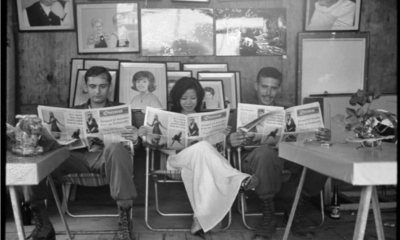
 Politics & Economy2 years ago
Politics & Economy2 years ago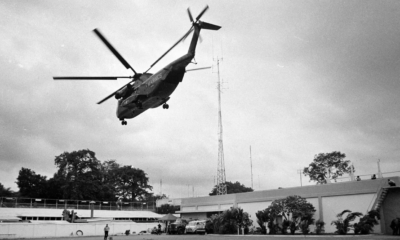
 After 19751 year ago
After 19751 year ago
 Society & Culture5 years ago
Society & Culture5 years ago
 ARCHIVES5 years ago
ARCHIVES5 years ago
 Politics & Economy4 years ago
Politics & Economy4 years ago
 Politics & Economy5 years ago
Politics & Economy5 years ago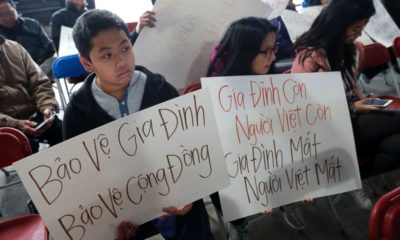
 Vietnamese-America4 years ago
Vietnamese-America4 years ago
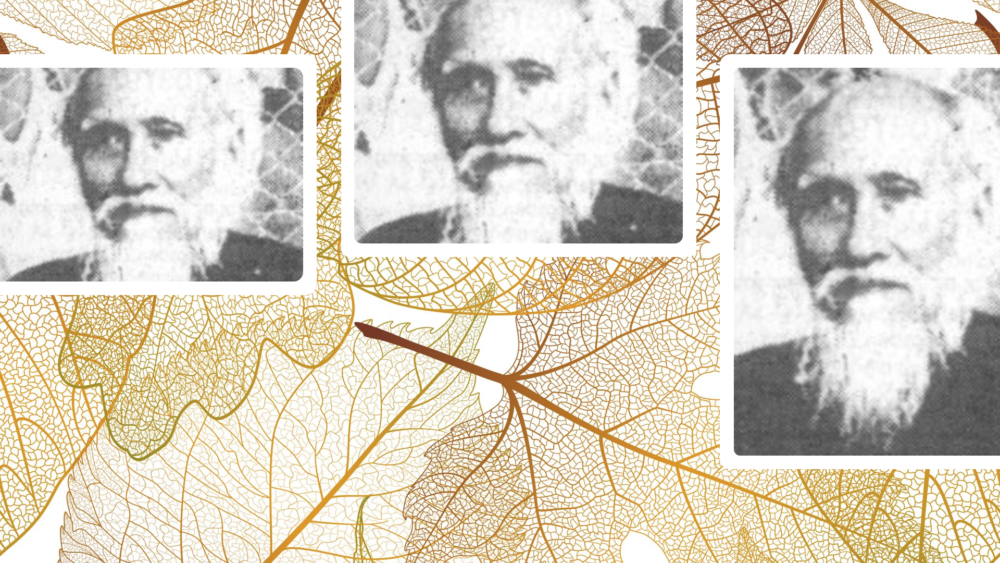
 Since Tu refused to confess that he worked for the CIA, in December 1975, he was sent to Chi Hoa prison, the main penitentiary in the city. He was living with criminals, burglars, and murderers even though the Communists knew he was a reporter. At first it was difficult, but when he accidentally discovered the criminal’s code of honor, they treated him kindly. One day he lit a cigarette for a man, who then expressed his gratitude. He said no one in his life had ever done that for him and that it was a mark of friendship. From then on, this man protected Tu and brought Tu’s rations to him.
Since Tu refused to confess that he worked for the CIA, in December 1975, he was sent to Chi Hoa prison, the main penitentiary in the city. He was living with criminals, burglars, and murderers even though the Communists knew he was a reporter. At first it was difficult, but when he accidentally discovered the criminal’s code of honor, they treated him kindly. One day he lit a cigarette for a man, who then expressed his gratitude. He said no one in his life had ever done that for him and that it was a mark of friendship. From then on, this man protected Tu and brought Tu’s rations to him. Now committed to leaving Vietnam, Tu needed an escape plan. In July 1989, he traveled north to Haiphong, where a friend gave him some gold to purchase his place on a boat that was leaving for Hong Kong. Although he never discussed it, his escape was probably helped by the Communist security cadre. Given the heavy travel restrictions inside Vietnam, and since he was currently under the watchful eye of the local security police, it would have been very difficult to travel from Saigon in the south to Haiphong in the north without approval.
Now committed to leaving Vietnam, Tu needed an escape plan. In July 1989, he traveled north to Haiphong, where a friend gave him some gold to purchase his place on a boat that was leaving for Hong Kong. Although he never discussed it, his escape was probably helped by the Communist security cadre. Given the heavy travel restrictions inside Vietnam, and since he was currently under the watchful eye of the local security police, it would have been very difficult to travel from Saigon in the south to Haiphong in the north without approval.





